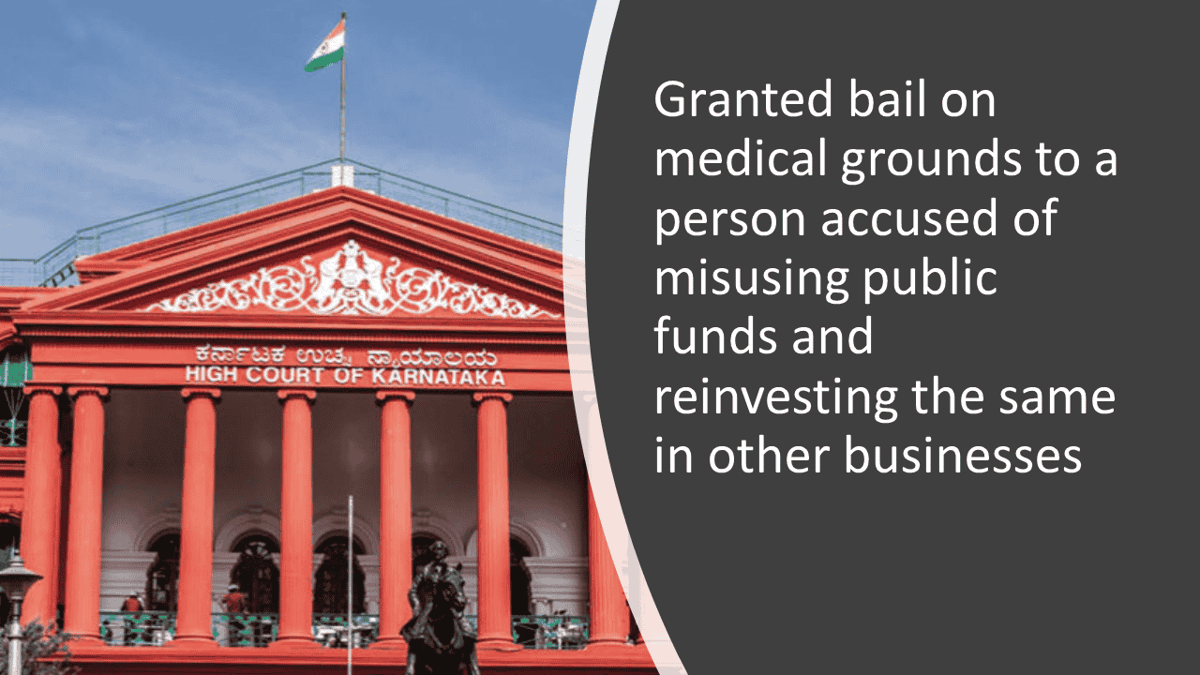Granted bail on medical grounds to a person accused of misusing public funds and reinvesting the same in other businesses
CA Bimal Jain | Aug 4, 2021 |

Granted bail on medical grounds to a person accused of misusing public funds and reinvesting the same in other businesses
In Sri Nanjundaiah v. Union of India Directorate of Enforcement, Karnataka, The State of Karnataka Bengaluru [C.P. No. 45 of 2021 connected with C.P. No. 43 of 2021 dated July 28, 2021], Sri Nanjundaiah (“the Petitioner”), the founder of Kanva Souhardha Co- operative Credit Limited (“Society”) has filed the Bail Application in Special Criminal Case No.846/2020 registered by the Directorate of Enforcement (“the Respondent”) for the offence punishable under Section 4 of the Prevention of Money Laundering Act, 2002 (“PML Act”).
The Respondent objected the bail petition and contended that the Petitioner is involved in cheating more than 13,000 investors who are the members of the Society. The Petitioner has not repaid the amount and also borrowed the loan out of the invested amount. Further, the Petitioner has mis-used the funds of the public and re-invested the
money in other businesses like Club, Garments, Resorts, Health Care etc. A PublicInterest Litigation (“PLI”) petition is also pending before the Division Bench.
The Petitioner contended that he has not at all committed any offence. The Petitioner admitted that funds and investments have collected from the Society members, but not from the public. Out of the amount collected from the persons, the money was used in other businesses and out of the profit, the Petitioner used to pay the Society and in
turn the Society used to repay the same. Due to some loss in the business by that time, the complaint came to be lodged by some investors. But there is no intention of the Petitioner to cheat any of the investors. The Petitioner has invested the money for the purpose of business of the properties which were attached by the State under the Karnataka Protection of Interest of Depositors in Financial Establishments Act, 2004 (“KPID Act”) and the Respondent. Further, the accounts were also freezed.
Furthermore, stated that the Petitioner is ready to repay the amount to the investors by selling the properties. Therefore, the Petitioner’s presence is necessary by coming out of the jail.
The Petitioner further stated that, he is suffering from many chronic diseases like prostate cancer, Diabetes, Hyper tension, depression etc. Therefore, on the medical grounds, the Petitioner prays for granting bail and has produced various medical records in this behalf.
The Hon’ble Karnataka High Court, relying upon the judgement in case of Mohammad Mansoor Khan v. The Directorate of Enforcement [Crl.P.No.4580/2020 dated October 19, 2020] and Sanjay Chandra vs. CBI reported in (2012) 1 SCC 40 and Syed Abdul Ala vs. NCB [ILR 2003 KAR 474] held that only on the medical ground for the purpose of providing medical treatment and protection of the Petitioner, bail will be granted and no prejudice will be caused to the prosecution case.
Held that the Petitioner is directed to release on the bail on the following conditions:
DISCLAIMER: The views expressed are strictly of the author and A2Z Taxcorp LLP. The contents of this article are solely for informational purpose. It does not constitute professional advice or recommendation of firm. Neither the author nor firm and its affiliates accepts any liabilities for any loss or damage of any kind arising out of any information in this article nor for any actions taken in reliance thereon.
In case of any Doubt regarding Membership you can mail us at [email protected]
Join Studycafe's WhatsApp Group or Telegram Channel for Latest Updates on Government Job, Sarkari Naukri, Private Jobs, Income Tax, GST, Companies Act, Judgements and CA, CS, ICWA, and MUCH MORE!"